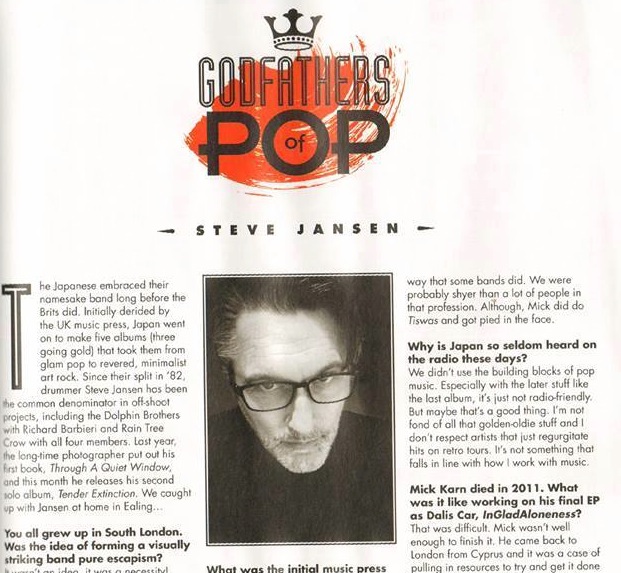Steve Jansen, Japan, for Classic Pop
The Japanese embraced their namesake band long before the Brits did. Initially derided by the UK music press, Japan went on to make five albums (three going gold) that took them from glam pop to revered, minimalist art rock. Since their split in ’82, drummer Steve Jansen has been the common denominator in off-shoot projects, including the Dolphin Brothers with Richard Barbieri and Rain Tree Crow with four Japan members. Last year, the long-time photographer put out his first book, Through a Quiet Window, and this month he releases his second solo album, Tender Extinction. Classic Pop caught up with Jansen at home in Ealing.
You all grew up in Catford, South London. Was the idea of forming the visually striking Japan pure escapism?
It wasn’t an idea, it was a necessity. When we were growing up there were suddenly certain pop stars suggesting things that were possible, rather than this mundane look that was going on at the time. It was more adventurous and androgynous, and you played with your sexuality. When you bumped into some skinheads down Catford High Street it made you feel very different, and that was a good feeling.
Were you ever beaten up?
Just the once. David and I were waiting at a bus stop and this group of thugs started calling us names, because the assumption was that you were gay. We knew they were going to catch us, so we stopped running. They just bundled us for a few minutes and ran off.
You wouldn’t be able to run in your outfits anyway, would you?
What do you think we were wearing, stilettos? It was just the long dyed hair, really. We’d have been all right if we’d been in Chelsea, or even North London. But South London? Nah.
What was the initial music press reaction to Japan?
Scathing! I can’t blame them – we were learning our craft and we looked pretty strange. We were slated by the NME for being pretentious and manufactured. Paul Morley was the one. He hated the first few albums, then completely changed his opinion around Tin Drum. But then, what does he know?
You had a classic pop manager, Simon Napier-Bell. What was that like?
He can blag. He can generate interest. The fact that he pursued a record contract was good, but there were issues with money. I didn’t trust him. A lot must have been made from our first tour in Japan, selling out two nights at 12,000-seaters and selling merchandise, but we didn’t really see any of it. It carried on that way right to the last world tour, from which we walked away with six grand. Probably the lighting guy made more.
Japan had quite an aloof image. Is that fair?
We didn’t really play the game and represent ourselves in the way that some bands did. We were probably shyer than a lot of people in that profession. Although, Mick did do Tiswas and got pied in the face.
Why do you think Japan is seldom heard on the radio these days?
We didn’t use the building blocks of pop music. Especially with the later stuff like the last album, it’s just not radio-friendly. But maybe that’s a good thing. I’m not fond of all that golden-oldie stuff and I don’t respect artists that just regurgitate hits on retro tours. It’s not something that falls in line with how I continue to work with music.
Mick Karn died in 2011. What was it like working on his final EP as Dalis Car, InGladAloneness?
That was difficult. Mick wasn’t well enough to finish it. He came back to London from Cyprus and as his health deteriorated it was a case of pulling in resources to try and get it finished for him. He asked if I’d mix it to make sure it got out there. He felt that I was someone he could leave it in the hands of. He wanted his son to have something from that period.
What do you think of the way equipment has changed since Japan’s era? These days you work mainly with a laptop and you found one singer on Soundcloud.
There are things to be said for analogue… but not a lot. Maybe the look. You don’t need all that chunky gear filling up your house when you can have virtual synths. It’s more fun because you can transform each sound. Composition for me isn’t about finding a nice set of chords and a song to sit on the top, it’s more atmospheric. I like to work with things that suggest ideas.
Next up you’ll be working again with singer Thomas Feiner, who appears on your solo album Tender Extinction. Will you tour?
There’s no reason why not. It’s a band project – three Swedes and myself. Thomas can get up there and sing, and everyone’s into the idea.
Physical copies of Steve’s solo album, Tender Extinction, are available via stevejansen.bandcamp.com and burningshed.com. It’s also downloadable on iTunes.


